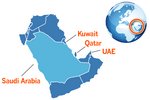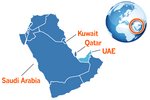Working as a "traveler" in the United States attracts
individuals who have no dependents, or other reasons which
keep them in one location. It also pays better. It allows
you to live in parts of the US you might not otherwise have
reason to visit, and, because your licensing is arranged for
you, and your housing and your relocation costs are paid, it
is made easy for you. Finally, you meet new people, make new
friends, and learn how things are managed (or mismanaged) in
different hospitals.
Working in the Middle East is, in many ways, like a long-term "travel" assignment:
-
With a minimum contract of one year, the assignments are
longer than the usual 13-week contracts in the US, but one
year is still short.
-
As in the US, housing is provided by the hospital, and
includes furnishings, basic linens, basic housewares, and
utilities.
-
Relocation airfare is paid, as is healthcare.
-
And while travellers in the US earn a higher salary and may receive some tax breaks, income in the Middle East is tax-free.
There are also significant advantages for those
travellers who want to see new places, meet
new people, and have new experiences. Working in the Middle East is geographically and
culturally unlike anything you will see in North America or Europe.
The desert is stark and beautiful, the patients will
intrigue you, and your colleagues will be from places as
varied as Australia, Palestine, Ireland, and South Africa.
You can camp in the desert or you can pursue more Western interests: golf, salsa dancing, etc.
Finally, working as a traveller in the US, you are not paid
for vacation time. In Saudi Arabia, on the other hand, you
get 54 days of paid vacation per year. That's almost two
months of vacation each year, during which time you can see
the Pyramids, ski in Switzerland, or hike the Great Wall of
China.
So why not do some real traveling?







